Mental health issues have surged since COVID-19 and demand for support has increased. As we work towards developing our vision to create thriving communities where people can prosper, we need to offer accessible quality mental health care and support.
Older person mental health service
Torbay Older Person Mental Health (OPMH) service ensures we provide our statutory social care functions, alongside our partners Devon Partnership NHS Trust which provides community mental health services.
We work with older people and their families and carers who are experiencing complex mental health difficulties including dementia. The service prides itself on actively challenging perceptions of older age, oppression, and discrimination. Social workers have expertise in areas of assessment, safeguarding, individual and family therapeutic intervention.
Our work is underpinned by legislative frameworks (the Care Act 2014, the Mental Health Act 1983/2007, the Mental Capacity Act 2005, the Human Rights Act 1998, the Equality Act 2010 etc.), which ensure evidence-based and proportionate interventions in the lives of the people whom we support.
We work with our partners to provide a multi-disciplinary approach to provide integrated care, improved communication, and timely joint visits to people who need our services. We work with those who have dementia as well as those with life-long mental illnesses such as depression and anxiety.
We work hard to involve families in assessments and decision making from the start. We have a dedicated carer support worker who can come alongside loved ones with knowledge and compassion at critical times. Our team of social workers and community care workers understand the legal aspect of caring for their loved ones when they can no longer make decisions for themselves and help families through this.
We are creative in care planning recognising that everyone is an individual and one size doesn’t fit all. We believe people have the right to take risks even in older age and we champion people’s rights to live independently for as long as possible in their own homes and will help find specialist carers to achieve this.
We are skilled in safeguarding older people from those who may not have their best interests at heart.
We are skilled practitioners who have a wealth of expertise and experience in older age mental disorders. We support and work collaboratively with our social care colleagues through the Link Work scheme where specialist mental health support and joint working is offered to social work colleagues who are working with people who might be experiencing mental health difficulties. This also provides an opportunity to identify people who are in need of social care and would benefit from the care of the specialist mental health service.
We are proud to host student social workers, several of whom have stayed with as qualified workers. We have also supported social workers to complete specialist training as Approved Mental Health Professionals, which enhances our legal literacy and speedy access to enhanced expertise. We embrace a grow your own approach having supported several excellent community care workers through the Open University training programme to become qualified social workers. For the first time this year we are supporting one of our community care workers to undertake the social work apprenticeship programme.
Dannielle - social worker apprentice
My goal to become a social worker started prior to working within the NHS, however I felt the goal was unachievable until I secured my job within the arranging support team. I was thrilled as I had been told that progression and training within the NHS is exceptional and after exploring roles I moved to the team as a Community Care Worker.
During my interview I was told I had the makings of a social worker and that with support it would be possible. The manager saw the potential for a home-grown social worker. Within a year of my new role, I started the degree.
The team has been very supportive; my casework is allocated with my learning experience and development in mind, which ensures that I see a range of circumstances and complexity. When discussing my workload with management or within supervision, we discuss the theories linked to practice, which has helped my understanding of the background of social work. The team also support me in reflecting on my work, which has enabled me to better my practice and ensures I work in a person-centred way. I feel that I have benefitted from completing the degree alongside my work and being able to work alongside experienced social workers.
The support has been incredible and has changed my whole life path. I hope that other teams can learn from this and continue to develop their staff skills and support their decisions to better their careers.
Care Home Education and Support Service (CHESS) - (part of the OPMH)
CHESS provides support, advice, and guidance to care homes in Torbay. Their role is to support care homes to develop ways to improve the mental health and wellbeing of residents who have a diagnosis of dementia, and who present with the associated behavioural and psychological challenges (BPSD) of the condition.
CHESS is a multidisciplinary team and develops collaborative partnerships across health and social care to enhancing the quality of service and lived experiences of people living in care homes and experiencing the symptoms of BPSD.
CHESS receives an average of 37 referrals a month and our caseworkers spend an average of 45 days per caseload.
In April 2022 a 12-month development project began to implement CHESS as a standalone service with dedicated staff members from Devon Partnership Trust and Torbay and South Devon Foundation Trust. The trial was a success and was the? model of care for Torbay-based care home dementia patients.
The service continues to develop and is now an integral part of the Enhanced Health in Care Homes (EHCH) support network. Thanks to investment from NHS England, there are exciting plans to develop the service further during the next 12 months.
The development will focus on the provision of specialist dementia education to the care homes across south Devon in non-pharmacological approaches. Historically the service has had to focus on reactive interventions due to the volume of work received, but there is now the opportunity to explore proactive educational work with equal parity to improve the quality of life for those with dementia residing in residential and nursing care environments.
PAL Pilot Project Occupational Therapist - Quality Assurance and Improvement Team
I completed a PAL training session at W H residential home and they were full of praise for your team member who recently delivered the Dementia training. Just thought you would appreciate knowing.
Social Worker OPMH Team Chadwell
Mrs J, a resident at a care home with a diagnosis of dementia was presenting with severe distress and agitation. Through collaborative working with CHESS health and Social Care workers, the service user, the son, the care home and additional support through a care agency we were able to provide a protective “wrap around” care package which has reduced her agitation and distress, and meant that she can remain at the care home, without having to move.
Chess also worked really closely with the staff in the care home to develop an individual support plan that’s put Mrs J at the centre of the plan and support the staff to really understand the Mrs J presentation and make changes in things like the environment , communication, and strategies for de-escalating situations and distraction techniques
The care home had considered serving the resident notice and, as no other care homes were able to accept her into their homes due to the level of distress that she was exhibiting and one point there was a consideration being given to an admission to acute psychiatric care. This was all extremely distressing for Mrs J’s family, However with intensive support of CHESS the situation was stabilised and improvements in Mrs J presentation started to be notice and Mrs J quality of life started to considerably improved.
Mental health adult social care team
Our mental health social workers assess eligible social care needs and plan support with people and their families and carers. We work with people to identify strengths in their networks and to access services and activities in their community that promote their independence, recovery, and social inclusion.
We buy packages of care and support to meet people’s unmet needs and regularly review the commissioned care, under statutory responsibilities.
We ensure section 117 aftercare rights of a person are reviewed and meet NHS policies, and any commissioned social care support is identified to support hospital discharge and reviewed in the community to ensure it continues to meet people’s aftercare needs.
We are undergoing a period of change, reviewing, and improving our process and procedures with a view to developing stronger partnerships not only with our colleagues in secondary mental health services, but also with our social work colleagues in all the teams across Torbay to provide the best quality care for people who need our help.
Approved Mental Health Professionals
The Torbay Approved Mental Health Professional (AMHP) service is a vital part of this delivery of care.
Our AMHPs are approved by Torbay Council to carry out certain duties under the Mental Health Act. They consider and coordinate Mental Health Act Assessments (MHAAs) and when satisfied that it is appropriate to do so, are responsible for making applications for Compulsory Admission to hospital in hospital for assessment/treatment of mental disorders, alongside various other statutory responsibilities, and duties. Their work adheres to the guiding principles of the Mental Health Act Code of Practice. Torbay has a 24/7 access to an AMHP.
Arranging a mental health act assessment is complex and wholly dependent upon multi agency working.
We take a person-centred approach to understand and respond to people’s mental health problems, and advocate for holistic care that considers their health, social circumstances, support networks and housing.
Decisions are made in partnership with the person, and everyone involved in their care, including their family and people have the capacity to support and affect change.
We explore the underlying factors that contribute to mental health crises, promoting recovery-oriented approaches, and our AMHPs play a crucial role in safeguarding people’s rights and liberties when making decisions about Compulsory Admission to hospital and treatment. We adopt a strong focus on proportionality, safeguards and human rights.
Being an AMHP presents both challenges and privileges. It involves connecting with people at crucial moments in their lives, offering support when they need it most and ensuring that they and their families are heard. AMHPs can make a difference, advocating for change within the mental health system.
The role of an AMHP is intellectually and emotionally stimulating and requires the development of expertise in both legal and clinical realms, often necessitating the delicate balancing of competing ethical considerations.
Furthermore, the work of an AMHP is characterised by its variety. Each day brings new experiences and challenges, ensuring that the role remains dynamic and engaging. Additionally, the legal landscape surrounding mental health is in a state of constant evolution, demanding that AMHPs stay informed and adaptable.
| Month | 2024 | 2023 | % change |
|---|---|---|---|
| January | 50 | 29 | 42% |
| February | 42 | 38 | 10% |
| March | 38 | 36 | 5% |
| April | 50 | 37 | 26% |
| May | TBC | 40 | Not available |
| June | TBC | 45 | Not available |
| July | TBC | 44 | Not available |
| August | TBC | 29 | Not available |
| September | TBC | 39 | Not available |
| October | TBC | 37 | Not available |
| November | TBC | 34 | Not available |
| December | TBC | 30 | Not available |
Emergency duty service
We are proud to share details of our emergency duty service (EDS) for the first time.
A social worker is available 24 hours a day, seven days a week. Outside of normal working hours (Monday to Friday, 9am to 5pm), this role is undertaken by the emergency duty service. This is a small team consisting of 6 qualified social workers and a further 5 Health and Social Care Co-ordinators. There is always at least one social worker on duty.
In practice this can mean that we can find ourselves moving from dealing with someone’s concerns about a young baby, to arranging a support package for an older person who is end of life, to undertaking a mental health act assessment to determine whether someone needs admission to hospital for treatment of mental ill health. The role is therefore very wide and varied, and being an emergency duty team means that we never know what situation will arise that needs us to offer support next. Our aims as a team are:
- To ensure that children, young people, and adults within Torbay remain safeguarded from harm.
- To ensure that the statutory social care responsibilities on the Integrated Care Organisation (ICO) and Torbay Council are met in a consistent and timely manner.
- To ensure that individuals in priority need of housing are placed in accommodation until the next working day when they can have a fuller assessment of need.
Mental health co-production
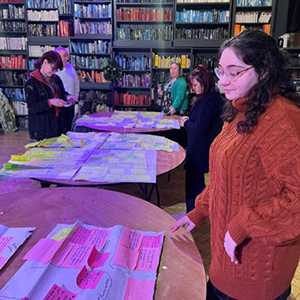 We can’t provide services that meet people’s needs without involving them in decisions about their care, and understanding if what we do meets their needs. Working with people who use our services, and their families and carers, and our people to co-produce our community-led support model is at the heart of what we do. Our guiding principles are:
We can’t provide services that meet people’s needs without involving them in decisions about their care, and understanding if what we do meets their needs. Working with people who use our services, and their families and carers, and our people to co-produce our community-led support model is at the heart of what we do. Our guiding principles are:
- Co-production brings people and organisations together around a shared vision
- There has to be a culture based on trust and empowerment
- There is a focus on communities and each will be different
- People are treated as equals, their strengths and gifts built on
- Bureaucracy is the absolute minimum it has to be
- People get good advice and information that helps avoid crises
- The system is responsive, proportionate and delivers good outcomes
Following the 2022 mental health summit we agreed to work with people who experience poor mental health and third sector providers from within the community and voluntary collective, to create a co-produced report that would influence how we might better invest in supporting people prior to requiring statutory mental health services. The hope was that solutions would emerge that would provide a vital link between primary, secondary, acute and community services and the voluntary sector to make sure people are receiving the joined-up care they need. The proposal is awaiting sign off and will be rolled out as part of the community wellbeing contract. We are reviewing the recommendations made within the co-production event with the Voluntary and Community Sector to ensure the aims are aligned and that the principles of peer support are delivered.
This joined-up approach will help our staff talk to people in community venues about what’s important to them and the kind of life they want to lead, and the support that’s available to achieve their goals. This is a dramatic shift away from care needs assessments that were narrow in focus and not very holistic in nature.
We are proud to be one of 27 areas in the country to adopt this approach to support people with mental health issues, and we are grateful to everyone who has supported us.
Torbay Council awarded £10,000 to the group to carry out the co-design work.
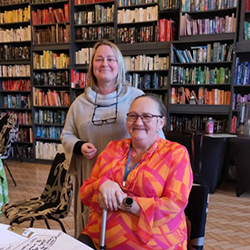
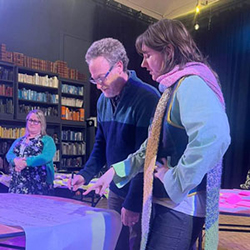
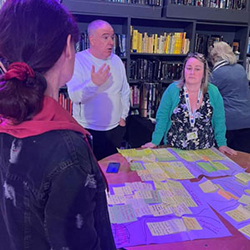
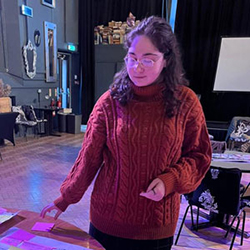
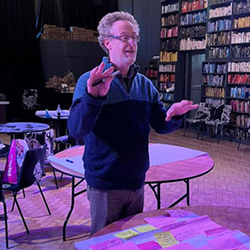
All photos are printed with permission from the participants of the co-production workshop.
More in About the council
- How the council works
- Councillors
- Leader of the Council
- Get in touch
- Voting and elections
- Consultations
- Finance and budgets
- Plans, policies and strategies
- Information and data
- Civic Mayor
- Pay an invoice
- Report fraud within or against the council
- Audit
- Achievements, Honours and Awards
- Climate Change
- Our Performance
- Greener Way for Our Bay